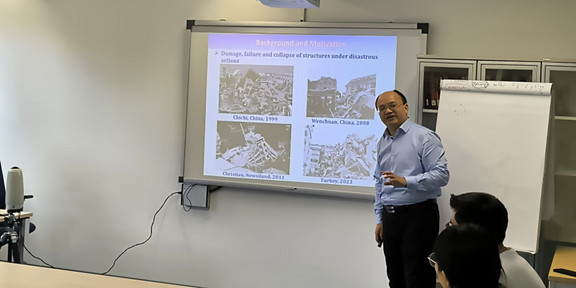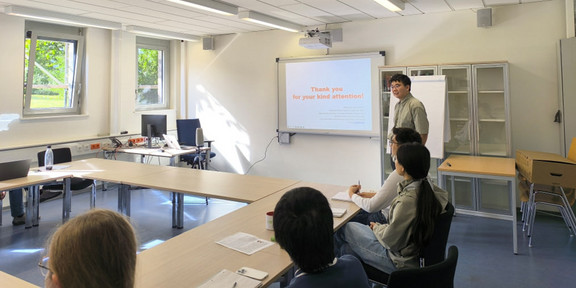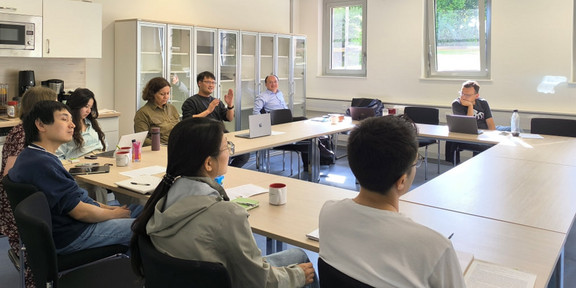Prof. Jianbing Chen and Dr. Meng-Ze Lyu Deliver Guest Lectures at the Chair for Reliability Engineering



The Chair for Reliability Engineering (CRE) hosted Prof. Jianbing Chen (Tongji University) and Dr. Meng-Ze Lyu (Hong Kong University of Science & Technology) between 1st to 5th September 2025. They delivered back-to-back guest lectures on Monday, 1 September. The two talks showcased experimental evidence of how spatial variability shapes structural responses and introduced a rigorous, low-dimensional framework for probability density evolution in complex stochastic dynamical systems.
Prof. Jianbing Chen presented “Experimental evidence for the effects of spatial variability of structures on the structural responses.” Drawing on shake‑table testing of concrete structural models, he demonstrated that even modest coefficients of variation in material parameters (e.g., concrete strength at around 5–10%) can translate into substantial discrepancies (on the order of 20–50%) in structural responses and performance measures. The findings underscore the necessity of treating spatial variability explicitly when assessing structural performance and reliability.
Dr. Meng‑Ze Lyu delivered “Dimension‑Reduced Probability Density Evolution Equation: Theory, Extensions, and Emerging Applications.” He outlined how the transient probability density function (PDF) of any path‑continuous response satisfies a low‑dimensional partial differential equation with first‑ and second‑order derivatives that is independent of the original system dimensionality or its Markov property. The intrinsic drift function-defined via conditional expectations-projects high‑dimensional driving forces into the reduced space. The framework extends to path‑discontinuous responses under Poisson excitations via partial integro‑differential equations and is equivalent to a dimension‑reduced Chapman–Kolmogorov integral formulation. With absorbing boundary processes, the approach supports first‑passage reliability analysis and enables dynamic reliability‑based design optimization. Applications discussed included seismic safety of high‑rise shear‑wall structures and the dynamic response of floating offshore wind turbines.
About the speakers
Prof. Jianbing Chen is University Distinguished Professor at Tongji University (College of Civil Engineering), a member of the Academic Committee of Tongji University, and Vice Director of the State Key Laboratory of Disaster Reduction in Civil Engineering. His research spans nonlinear analysis of complex structures, uncertainty quantification, stochastic mechanics, engineering reliability, and design optimization. He is the author of four books-including Stochastic Dynamics of Structures (John Wiley & Sons, 2009)-and over 200 peer‑reviewed journal papers. His recognitions include the Natural Science Award of China (2016), the 2017 IASSAR Early Achievement Award, the National Science Fund for Distinguished Young Scholars (2017), the Gambrinus Fellowship of TU Dortmund, and the Humboldt Research Award (2023). He serves on editorial boards such as Structure and Infrastructure Engineering, ASCE–ASME Journal on Risk and Uncertainty in Engineering Systems, and others.
Dr. Meng‑Ze Lyu is a postdoctoral fellow in the Department of Civil & Environmental Engineering at the Hong Kong University of Science & Technology. He received his B.Sc. (2015), M.Eng. (2017), and Ph.D. (2022) from Tongji University. His research interests include stochastic dynamics, reliability analysis, and design optimization of complex engineering systems, with contributions to dimension‑reduced probability density evolution (DR‑PDEE), time‑variant extreme value distributions for Markov processes, and the multi‑probability density evolution method (M‑PDEM). He has authored 40+ publications (33 peer‑reviewed English journal papers) and serves as Deputy Secretary‑General of the Random Vibration Committee of the Chinese Society for Vibration Engineering. He is a member of the Early Career Editorial Board for the ASCE–ASME Journal of Risk & Uncertainty in Engineering Systems (Parts A & B) and leads projects funded by DFG and NSFC.








